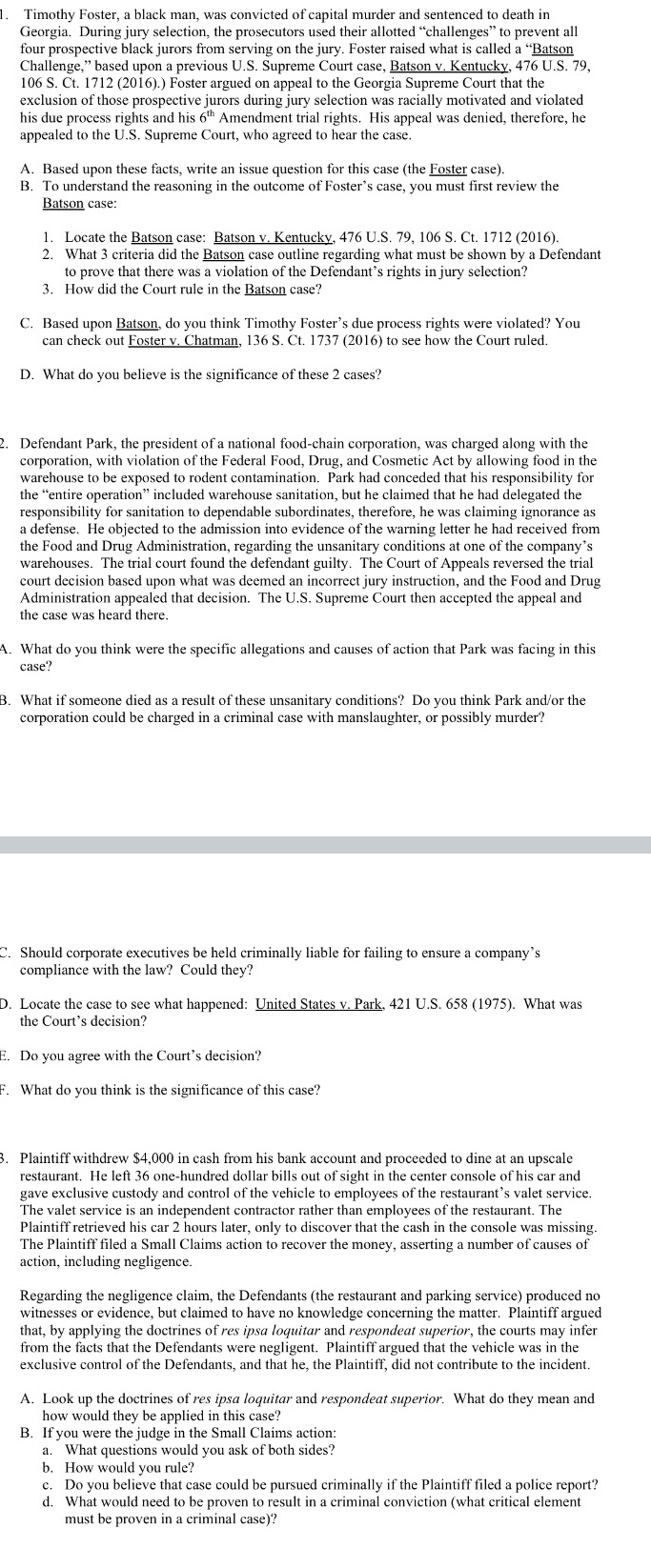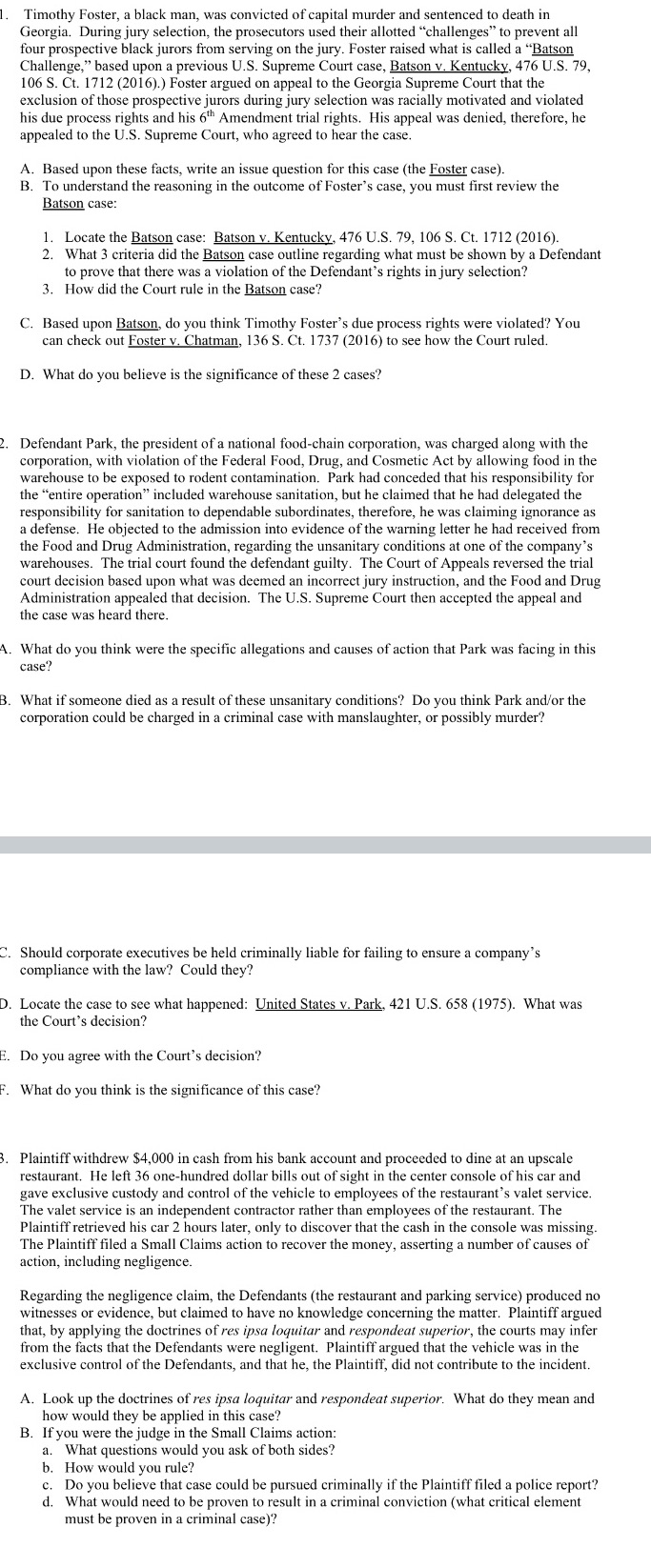
L. e Timothy Foster, a black man, was convicted of capital murder and sentenced to death in Georgia. During jury selection, the prosecutors used their allotted \"challenges to prevent all four prospective black jurors from serving on the jury. Foster raised what is called a \"Batson Challenge,\" based upon a previous U.S. Supreme Court case, Batson v. Kentucky, 476 U.S. 79, 106 S. Ct. 1712 (2016).) Foster argued on appeal to the Georgia Supreme Court that the exclusion of those prospective jurors during jury selection was racially motivated and violated his due process rights and his 6 Amendment trial rights. His appeal was denied, therefore, he appealed to the U.S. Supreme Court, who agreed to hear the case. A. Based upon these facts, write an issue question for this case (the Foster case). B. To understand the reasoning in the outcome of Foster's case, you must first review the Batson case: 1. Locate the Batson case: Batson v. Kentucky, 476 U.S. 79, 106 S. Ct. 1712 (2016). 2. What 3 eriteria did the Batson case outline regarding what must be shown by a Defendant to prove that there was a violation of the Defendant's rights in jury selection? 3. How did the Court rule in the Batson case? C. Based upon Batson, do you think Timothy Foster's due process rights were violated? You can check out Foster v. Chatman, 136 S. Ct. 1737 (2016) to see how the Court ruled. D. What do you believe is the significance of these 2 cases? Defendant Park, the president of a national food-chain corporation, was charged along with the corporation, with violation of the Federal Food, Drug, and Cosmetic Act by allowing food in the warchouse to be exposed to rodent contamination. Park had conceded that his responsibility for the \"entire operation included warehouse sanitation, but he claimed that he had delegated the responsibility for sanitation to dependable subordinates, therefore, he was claiming ignorance as a defense. He objected to the admission into evidence of the warning letter he had received from the Food and Drug Administration, regarding the unsanitary conditions at one of the company's warehouses. The trial court found the defendant guilty. The Court of Appeals reversed the trial court decision based upon what was deemed an incorrect jury instruction, and the Food and Drug Administration appealed that decision. The U.S. Supreme Court then accepted the appeal and the case was heard there. . What do you think were the specific allegations and causes of action that Park was facing in this case? . What if someone died as a result of these unsanitary conditions? Do you think Park and/or the corporation could be charged in a criminal case with manslaughter, or possibly murder? . Should corporate executives be held criminally liable for failing to ensure a company s compliance with the law? Could they? . Locate the case to see what happened: United States v. Park, 421 U.S. 658 (1975). What was the Court's decision? ". Do you agree with the Court's decision\"? What do you think is the significance of this case? Plaintiff withdrew $4.000 in cash from his bank account and proceeded to dine at an upscale restaurant, He left 36 one-hundred dollar bills out of sight in the center console of his car and gave exclusive custody and control of the vehicle to employees of the restaurant's valet service. The valet service is an independent contractor rather than employees of the restaurant. The Plaintiff retrieved his car 2 hours later, only to discover that the cash in the console was missing. The Plaintiff filed a Small Claims action to recover the money, asserting a number of causes of action, including negligence. Regarding the negligence claim, the Defendants (the restaurant and parking service) produced no witnesses or evidence, but claimed to have no knowledge concerning the matter. Plaintiff argued that, by applying the doctrines of res ipsa loguitar and respondeat superior, the courts may infer from the facts that the Defendants were negligent. Plaintiff argued that the vehicle was in the exclusive control of the Defendants, and that he, the Plaintiff, did not contribute to the incident. A. Look up the doctrines of res ipsa loguitar and respondeat superior. What do they mean and how would they be applied in this case? B. If'you were the judge in the Small Claims action: 4. What questions would you ask of both sides? How would you rule? Do you believe that case could be pursued criminally if the Plaintiff filed a police report? What would need to be proven to result in a criminal conviction (what critical element must be proven in a criminal case)? oo








